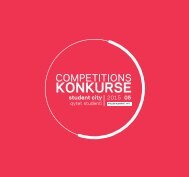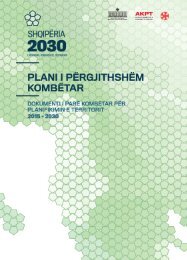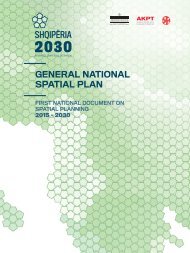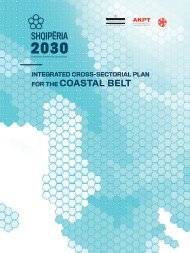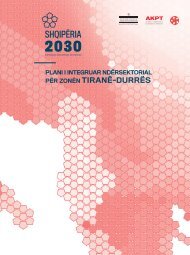Integrated Cross-Sectorial Plan of Tirana-Durres Area
The Albanian Government and the National Spatial Plan have identified the Tiranë-Durrës area, as one of the most important economic areas of the country, and of the Balkan region. To ensure a sustainable territorial and urban development of this area, the Ministry of Urban Development in cooperation with the National Territorial Planning Agency has taken the initiative to draft a Cross-sectoral Integrated Plan for the economic area Tiranë – Durrës. The metropolitan region under study includes territories administered by 5 municipalities: Tiranë, Durrës, Vorë, Shijak, Kamëz.
The Albanian Government and the National Spatial Plan have identified the Tiranë-Durrës area, as one of the most important economic areas of the country, and of the Balkan region. To ensure a sustainable territorial and urban development of this area, the Ministry of Urban Development in cooperation with the National Territorial Planning Agency has taken the initiative to draft a Cross-sectoral Integrated Plan for the economic area Tiranë – Durrës. The metropolitan region under study includes territories administered by 5 municipalities: Tiranë, Durrës, Vorë, Shijak, Kamëz.
You also want an ePaper? Increase the reach of your titles
YUMPU automatically turns print PDFs into web optimized ePapers that Google loves.
Based on the priority areas <strong>of</strong> enterprise development in the metropolitan region, it is herein proposed:<br />
Territorial potentials <strong>of</strong> regional incubators<br />
TIRANA<br />
DURRES<br />
KAMEZ<br />
SHIJAK<br />
- business innovation<br />
incubators; (northern<br />
area, the boulevard<br />
“Dëshmorët e Kombit”)<br />
- academic incubators<br />
for creating the<br />
knowledge cluster;<br />
(Centre <strong>of</strong> <strong>Tirana</strong>/<br />
University area)<br />
- business innovation<br />
incubators (Spitalle<br />
area);<br />
- sectorial incubators;<br />
(Shkozet)<br />
- general incubators.<br />
(<strong>Durres</strong> centre)<br />
- agro-incubators;<br />
- sectorial incubators.<br />
(Kamez, economic<br />
corridor)<br />
- agro-incubators;<br />
(Shijak centre)<br />
- sectorial incubators.<br />
(economic area)<br />
- sectorial incubators <strong>of</strong><br />
creative industry.<br />
(Kinostudio; former<br />
textile combine); (Former<br />
auto-tractor company)<br />
Table 4.2 Regional incubators<br />
Incubators can be developed in public, private,<br />
or cooperation schemes (PPP). Triple-helix<br />
operation structures need to be developed<br />
for their establishment (central / local<br />
government-business - academia interaction).<br />
Regarding the territorial development, it is<br />
suggested that these structures be placed<br />
near the economic poles, areas and corridors,<br />
or knowledge and research institutions,<br />
supported by very good access to public<br />
transport.<br />
Incubators can also be used as territorial<br />
development instruments, serving as catalysts<br />
to regenerate former industrial areas, using<br />
physical assets under state administration.<br />
They can be accommodated in structures<br />
under public ownership or administration.<br />
Their development can be accomplished<br />
through PPP schemes, where state institutions<br />
run the process by building frameworks and<br />
monitoring long-term development.<br />
Incubation stages<br />
Pre-incubation, is related to the overall activity<br />
necessary to support potential entrepreneurs<br />
to develop their ideas and business plan<br />
to strengthen the opportunities for the<br />
achievement <strong>of</strong> an effective and successful<br />
start-up. These is achieved through training<br />
and specific assistance throughout the steps<br />
and objectives.<br />
Incubation takes care <strong>of</strong> the necessary support<br />
for start-ups, up to the expansion stage. This<br />
process usually lasts up to 3 years <strong>of</strong> the<br />
activity <strong>of</strong> a new venture, which coincide with<br />
the most significant years for its development<br />
and achievement <strong>of</strong> maturity. The support<br />
in this phase usually consists <strong>of</strong> access to<br />
services, in: financing, training, consulting,<br />
guidance and specific training.<br />
Post-incubation relates to the establishment<br />
<strong>of</strong> services and the performance <strong>of</strong> activities<br />
when a company has reached the conditions<br />
and stage <strong>of</strong> maturity and it can go on by itself.<br />
79






